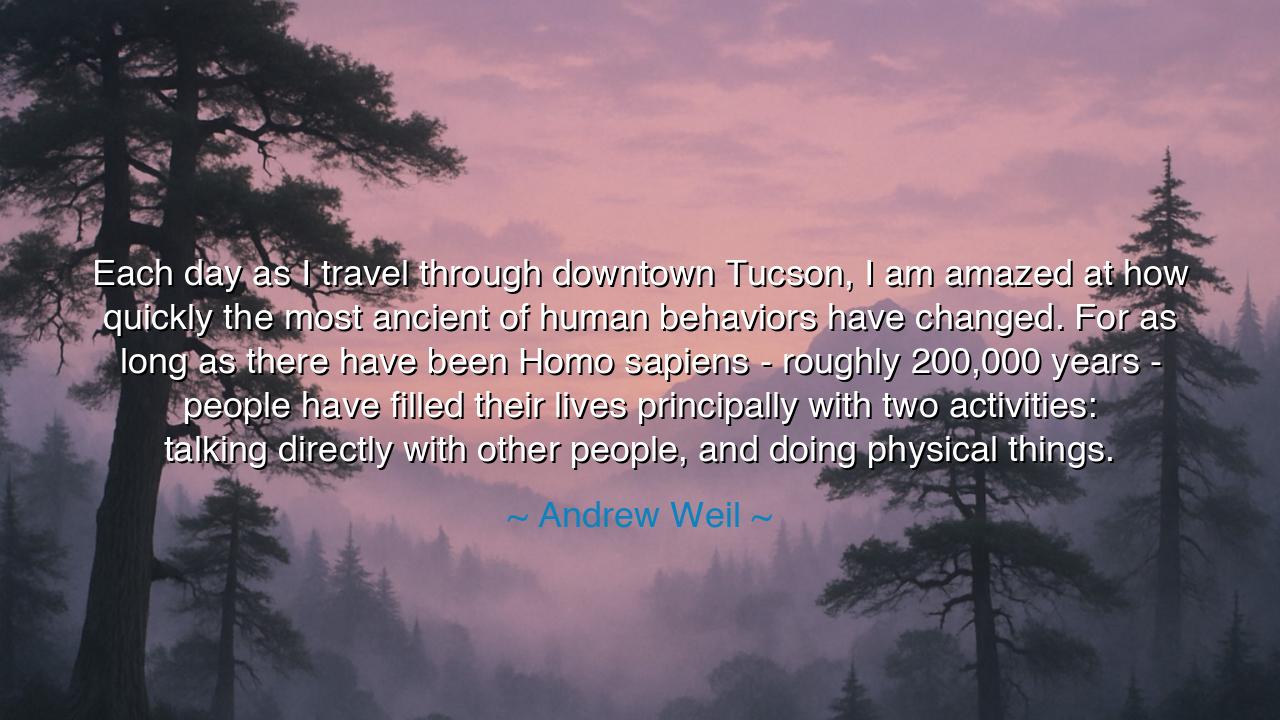
Each day as I travel through downtown Tucson, I am amazed at how
Each day as I travel through downtown Tucson, I am amazed at how quickly the most ancient of human behaviors have changed. For as long as there have been Homo sapiens - roughly 200,000 years - people have filled their lives principally with two activities: talking directly with other people, and doing physical things.






Hear, O listener, the words of Andrew Weil, who gazed upon the streets of his city and spoke: “Each day as I travel through downtown Tucson, I am amazed at how quickly the most ancient of human behaviors have changed. For as long as there have been Homo sapiens—roughly 200,000 years—people have filled their lives principally with two activities: talking directly with other people, and doing physical things.” These words are not only observation, but lament and warning, a reminder that what was once the very foundation of human life can be swept away in but a few generations.
At the heart of his saying lies the truth of ancient human behaviors. For two hundred millennia, men and women lived by their bodies and their voices. They built shelters with their hands, hunted and gathered with sweat, tilled the earth, carried water, raised children with strength of arm and heart. They spoke face to face, their words shaped by breath, gesture, and presence. These were not luxuries, but the very rhythm of existence—the pulse by which humanity grew strong and endured.
Weil’s astonishment is that in but a few decades, these foundations have shifted. The world has grown filled with screens, wires, and machines. Where once men spoke across the fire, now they tap upon glowing glass; where once women carried baskets or ground grain, now buttons are pressed and engines serve. Direct conversation has diminished, replaced by messages without tone, eyes, or touch. Physical activity has withered, replaced by mechanical ease and sedentary comfort. What took two hundred thousand years to form has been overturned in the blink of history’s eye.
This truth is echoed by the ancients. Consider the philosophers of Greece, who gathered in the agora, speaking face to face in debate, sharpening one another through dialogue. Think of the farmers of Egypt, whose labor along the Nile bound their muscles to the rhythm of the flood, or the hunters of the Ice Age, whose survival depended on strength, patience, and movement. Their lives were not easy, but they were real, lived in the full harmony of body and speech. What Weil mourns is that we, their descendants, are forgetting how to live in that harmony.
There is a story in history of Julius Caesar’s legions, men who marched twenty miles in a day, carrying their armor and building a fortified camp before nightfall. They conquered not only with strategy, but with discipline of body and unity of spirit. Now imagine such men, transported into our age, finding a people weary from sitting, bent over screens, speaking without voices. Would they not marvel at the swiftness with which strength and presence can be abandoned? Would they not ask how a people can forget in mere decades what their ancestors built for millennia?
Yet Weil’s words are not despair but reminder. He calls us to see that the human body and human voice are treasures not to be discarded. The habits of two hundred thousand years are not easily erased—they remain in our bones, in our breath, in our longing. We feel the ache to move, to sweat, to labor. We feel the yearning to speak face to face, to hear laughter ring not through speakers but in the air beside us. These instincts are not gone; they only wait for us to remember them.
The lesson, then, is this: return to the ancient ways, even as you live in the modern world. Do not allow machines to steal the work of your body, nor devices to replace the intimacy of your voice. Walk instead of always riding, build with your hands when you can, speak with your lips and eyes rather than only through your screens. Reclaim the wisdom of the past—not to reject the present, but to strengthen it. For the future will belong not to those who forget their humanity, but to those who unite the old ways with the new.
Thus, let Weil’s words be remembered as both warning and guide: the habits of our ancestors made us strong, and their loss makes us fragile. Cherish the talking face to face, cherish the doing of physical things. For in these ancient acts lies the secret of health, of connection, and of joy. And though the modern world dazzles with its swiftness, the truth is simple: the greatest treasures have been with us for two hundred thousand years, waiting only to be lived again.






AAdministratorAdministrator
Welcome, honored guests. Please leave a comment, we will respond soon